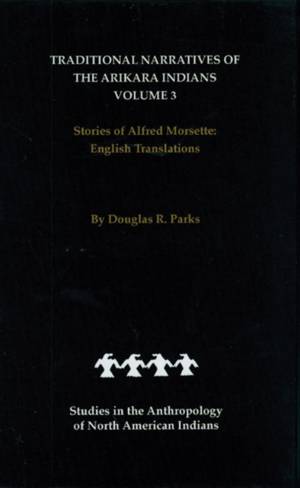
- Retrait gratuit dans votre magasin Club
- 7.000.000 titres dans notre catalogue
- Payer en toute sécurité
- Toujours un magasin près de chez vous
- Retrait gratuit dans votre magasin Club
- 7.000.0000 titres dans notre catalogue
- Payer en toute sécurité
- Toujours un magasin près de chez vous
Traditional Narratives of the Arikara Indians, English Translations, Volume 3
Stories of Alfred Morsette
Douglas R Parks
104,45 €
+ 208 points
Description
Until the late eighteenth century the Arikaras were one of the largest and most influential Indian groups on the northern plains. For centuries they have lived along the Missouri River, first in present South Dakota, later in what is now North Dakota. Today they share the Fort Berthold Indian Reservation in North Dakota with the Mandans and Hidatsas. Although their postcontact history and aspects of their culture are well documented, Douglas R. Parks's monumental four-volume work Traditional Narratives of the Arikara Indians represents the first comprehensive attempt to describe and record their language and literary traditions. Volumes 1 and 2 present transcriptions of 156 oral narratives in Arikara and include literal interlinear English translations. Volumes 3 and 4 contain free English translations of those narratives, making available for the first time a broad, representative group of Arikara oral traditions that will be invaluable not only to anthropologists and folklorists but to everyone interested in American Indian life and literature. The narratives cover the entire range of traditional stories found in the historical and literary tradition of the Arikara people, who classify their stories into two categories, true stories and tales. Here are myths of ancient times, legends of power bestowed, historical narratives, and narratives of mysterious incidents that affirm the existence today of supernatural power in the world, along with tales of the trickster Coyote and stories of the risque Stuwi and various other animals. In addition, there are accounts of Arikara ritualism: prayers and descriptions of how personal names are bestowed and how the Death Feast originated.
Spécifications
Parties prenantes
- Auteur(s) :
- Editeur:
Contenu
- Nombre de pages :
- 468
- Langue:
- Anglais
- Collection :
Caractéristiques
- EAN:
- 9780803236943
- Date de parution :
- 01-02-92
- Format:
- Livre relié
- Format numérique:
- Genaaid
- Dimensions :
- 152 mm x 229 mm
- Poids :
- 893 g

Les avis
Nous publions uniquement les avis qui respectent les conditions requises. Consultez nos conditions pour les avis.






